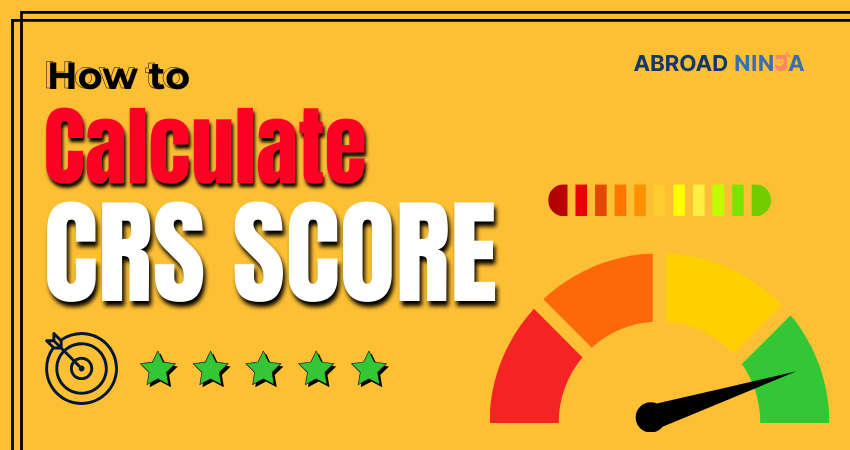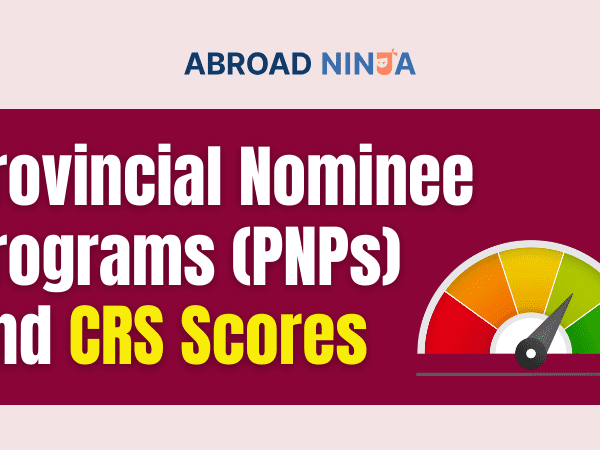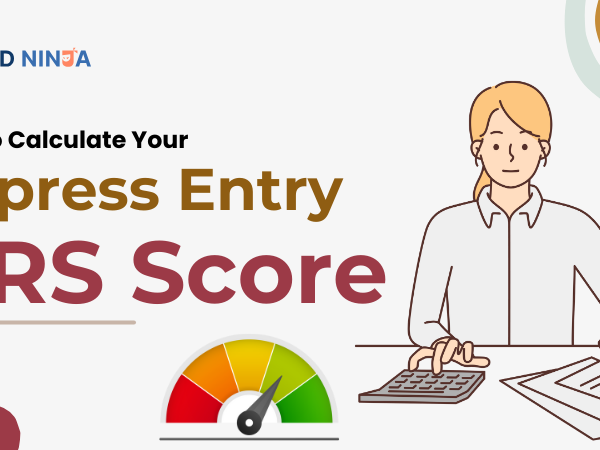Calculating a CRS score is essential for those wanting to move to Canada. The CRS is a points-based system used by the Canadian government to determine Express Entry eligibility. Factors such as age, education, language proficiency, and work experience are taken into account.
Age: This matters a lot in the scoring system. Generally, younger people get more points, as Canada’s economy needs them in the long run.
Education: Higher levels of education get more points, showing greater ability to do well in the Canadian labor market.
Language Proficiency: Candidates with superior skills in English or French will get higher scores. Tests like IELTS or CELPIP for English and TEF Canada for French are used to evaluate this.
Work Experience: Valuable for determining CRS score. Candidates with experience in in-demand occupations get favored.
Other Factors: Having a job offer from a Canadian employer or provincial nomination can increase CRS score.
Fact: CRS was introduced by IRCC on January 1st, 2015.
Understanding the CRS Score
The Comprehensive Ranking System (CRS) score plays a critical role in determining if an individual is eligible for Canada’s Express Entry program. It assesses candidates based on factors such as:
- age
- education
- work experience
- language proficiency
- adaptability
The higher the CRS score, the greater the chances of getting an invitation to apply for permanent residency.
Let’s break down its components:
| Criteria | Points |
|---|---|
| Age | Up to 110 |
| Education | Up to 150 |
| Official languages skills | Up to 260 |
| Canadian work experience | Up to 80 |
| Additional points | Up to 600 |
Age can earn you a max of 110 points depending on your age at the time of application. Younger people are likely to get a higher score. Similarly, education can get you up to 150 points if you have a Master’s degree or PhD.
Language proficiency is evaluated through standardized tests like IELTS or CELPIP. Depending on how much you score in listening, reading, writing and speaking, you can gain up to 260 points for English and French combined.
Having Canadian work experience gives an additional edge, with up to 80 extra points. This is to encourage those who have already contributed to Canada’s labor market.
Moreover, there are other ways to boost your CRS score such as having siblings in Canada, getting an educational credential assessment report or a job offer from a Canadian employer.
The CRS score was first implemented by Immigration, Refugees and Citizenship Canada (IRCC) in January 1st, 2015. Since then, it has been employed as an unbiased tool for selecting skilled immigrants who have the potential to positively contribute to Canada’s economy.
Factors Considered in CRS Calculation
To determine your CRS score accurately for Canadian immigration, delve into the factors considered in CRS calculation. Explore how age, language proficiency, education, work experience, spouse or common-law partner factors, and skill transferability factors play a crucial role in your overall CRS score. Gain a comprehensive understanding of each sub-section’s significance and its impact on your immigration prospects.
Age
Age is a critical element in the Comprehensive Ranking System (CRS) for immigration. Here’s the points allocation for different age groups:
| Age Group | Points Allocation |
|---|---|
| 18-35 years | 12 |
| 36 years | 11 |
| 37 years | 10 |
| 38 years | 9 |
| 39 years | 8 |
| 40 years | 7 |
The highest points are awarded to those between 18-35 years. This is due to their potential to contribute to the Canadian workforce and society.
Age is also highly important in the CRS score. Immigration, Refugees and Citizenship Canada (IRCC) takes age into account as it has an effect on an individual’s ability to join the labor market in Canada.
Interesting fact: IRCC research shows that younger immigrants usually have higher employment rates and more ease in adapting. This adds to Canada’s economic development.
Language Proficiency
Let’s explore language proficiency based on criteria like reading, writing, speaking and listening. Tests like CELPIP, IELTS, TEF, or other Canadian-approved exams can evaluate these areas.
Reading: IELTS 7.5, CELPIP – 9
Writing: IELTS 8, TEF – B2
Speaking: CELPIP – 10, TEF – C1
Listening: IELTS 8.5, TEF – B2
Canadians with educational backgrounds or French-speaking work experience may receive extra points. Showing language proficiency can increase your CRS score, increasing your chances of permanent residency in Canada.
Maximizing language proficiency can be key to a successful immigration journey. It can boost your CRS score and offer new possibilities for you and your family. Don’t miss this crucial part as it may make or break your ‘Canadian dream’.
Education
Educational Credentials Assessment (ECA) to evaluate foreign qualifications is a must. Master’s and doctoral degrees give more points for CRS. Fields of study like STEM boost CRS. Canadian study permit with a program in Canada adds CRS points too. Bilingualism, English & French, gives bonus CRS points. Documents & transcripts are required to assess abroad education. Recognized Canadian institutions stand out in evaluation.
Education holds the key to getting a high CRS score. Upgrade your education level. Relevant fields of study. Consider studies in Canada. Enhance language skills. These steps will increase chances of getting an invitation for PR.
Don’t miss out on the many possibilities a strong education offers. Invest in your education now for a better future. Start your educational journey today!
Work Experience
Work experience is a major factor in the Comprehensive Ranking System (CRS) calculation. It’s one of the aspects that Canadian immigration looks at to judge a person’s eligibility for permanent residence. Here are some key points about work experience:
- Relevant Work: To be eligible for certain immigration programs, applicants must have at least one year of full-time skilled work. The work should relate to their chosen occupation in Canada.
- Points Allocation: The number of points awarded is based on the duration and skill level of the work. The maximum of 15 points is given for six or more years of continuous full-time work.
- Skill Level: The National Occupational Classification (NOC) system is used to assess work experience. Depending on the NOC level, applicants can earn different CRS points.
- Extra Points: Certain types of work experience can earn added points. For example, having Canadian work experience, especially in a managerial or professional role, can give more points.
It’s important to have a detailed and verifiable work history when applying for Canadian permanent residency. To increase your CRS score and improve your chances of an invitation, consider these suggestions:
- Show Relevant Skills: Highlight skills that fit the requirements of your intended job in Canada. Show how you’ve achieved and what responsibilities you’ve had that prove your expertise.
- Get Reference Letters: Ask former employers or supervisors for reference letters. These should include details about your job duties and successes during employment.
- Include Language Proficiency: If you’ve developed English or French skills through your work, make sure this is included in your application. Language proficiency can earn more CRS points.
- Keep Learning: Demonstrate commitment to learning and advancing professionally. Join relevant training, certification programs, or workshops that improve your skills and knowledge.
By following these tips, you can highlight the relevance and quality of your work experience. This will boost your CRS score and increase your chances of successfully immigrating to Canada.
Spouse or Common-law Partner Factors
Spouse or common-law partner factors are important for the Comprehensive Ranking System (CRS) calculation. Education, language skills, work experience, and age can all have an effect on the CRS score. We can see this in the table below:
| Factor | Points |
|---|---|
| Education | Maximum 10 points |
| Language Skills | Maximum 20 points (10 per ability) |
| Work Experience | Maximum 10 points |
| Age | Maximum 10 points |
To get the most points, here are some tips:
- Education: Your partner should gain higher qualifications.
- Language Skills: Take language courses and tests.
- Work Experience: Aim for continuous skilled work.
- Age: Time your application strategically.
Remember that every point is valuable when it comes to the Comprehensive Ranking System.
Skill Transferability Factors
Skill transferability factors are important for CRS (Comprehensive Ranking System) scores. They measure an applicant’s skills in various fields and their ability to be used in Canada’s labor market.
Let’s look at the components:
Skill Transferability Factors | Education || Language Proficiency || Canadian Work Experience || Foreign Work Experience || Certificate of Qualification || Regional Immigration
Education is a factor. It judges educational backgrounds and degrees. It is important to show knowledge and expertise in the field.
Language proficiency is a large factor in CRS scores. Knowing English or French will help immigrants fit into the Canadian workforce.
Canadian work experience matters. Those with experience in the country have higher chances of fitting into the labor market.
Foreign work experience is also valued. It shows international experience that may help Canada’s economy.
Certificate of qualification is important. Those with certifications will have better chances to contribute in their field.
Regional Immigration matters too. Candidates who show interest in moving to certain provinces with labor shortages can get high scores.
These skill transferability factors are important for immigrants who want to settle in Canada. Knowing and using these criteria can help reach immigration goals and build a future in Canada.
Also Read: How Much IELTS Score Required for Canada PR
Calculating the CRS Score
To calculate the CRS score, start with assessing core human capital factors, followed by evaluating spouse or common-law partner factors. Then, determine skill transferability factors and factor in any additional points. Each sub-section plays a crucial role in determining your CRS score in the immigration process.
Step 1: Assessing Core Human Capital Factors
3 core factors of human capital to consider when assessing CRS scores:
- Age: Younger applicants usually hold higher scores, owing to their potential for long-term contributions to the economy.
- Education Level: Higher levels of education fetch more points in the labor market.
- Official Language Proficiency: Knowing one or both of Canada’s official languages (English/French) is essential. High proficiency leads to more employment opportunities.
Points allocated differ, depending on individual circumstances. To improve your CRS score:
- Pursue additional certifications or degrees that Canadian industries recognize and value.
- Invest in language courses to boost English/French proficiency.
- Utilize any remaining years before reaching higher age brackets, to gain maximum points.
This increases chances of obtaining a higher CRS score, thus improving prospects for successful immigration.
Step 2: Assessing Spouse or Common-law Partner Factors
Step 2 of the CRS score is about your partner. Here’s how to do it:
- Age: Work out your partner’s age and give points. Ages 18-35 get most points.
- Education: See what your partner has studied and give points.
- Language: Test their English or French and give points.
- Work Experience: Give points for years of skilled work.
These factors count for a lot in the CRS score, so pay attention to them.
For example, Prem and Karan got lots of points from Sarah’s education and language. That helped them move to Canada.
Step 3: Assessing Skill Transferability Factors
The evaluation of skill transferability is a vital part of the CRS score. We assess many things that decide how well an individual’s abilities can be used in the Canadian labor market. For example:
- Occupation-relatedness: Checking if the individual’s old job is similar to ones sought after in Canada.
- Educational attainment: Looking at the level and importance of the applicant’s qualifications.
- Work experience: Examining the length and type of the applicant’s work experience, within and outside Canada.
- Language proficiency: Testing language abilities in English or French; as they are highly valued in Canadian workplaces.
Also, other factors may be taken into consideration during the evaluation process. This kind of assessment ensures fairness and helps people applying through Express Entry.
Don’t forget to maximize your CRS score! Use this step to highlight your skills and increase your chances of getting an invitation to apply for permanent residency in Canada. Provide accurate information and show off transferable skills, to improve your application!
Step 4: Additional Points
It’s vital to know that extra points can significantly increase your CRS score and enhance your chances of settling in Canada. Beyond the standard categories, there are further details like jobs and programs which can provide additional points. For instance, a valid job offer from a Canadian employer or having a sibling already in Canada can give you bonus points.
Prem Nath, an engineer with a few years of experience but average language skills, illustrates the significance of looking for extra points. Initially, his CRS score did not fulfill the minimum requirement. However, he decided to pursue provincial nomination when he found out his occupation was in-demand in Canada. The nomination gave him extra points and enabled him to reach his dream of immigrating to Canada.
Prem’s story illustrates how considering extra points can help an individual achieve immigration. It emphasizes that understanding the Canadian immigration system and staying updated on occupation lists and provincial programs can maximize your CRS score and raise your chances of becoming a permanent resident.
Examples of CRS Calculation
The Comprehensive Ranking System (CRS) score is calculated by considering various factors. To show this, let’s take an example of an individual with the following details:
- Age: 30 years
- Education: Master’s degree
- Language proficiency: CLB 9 in English and CLB 8 in French
- Work experience: 3 years
- Valid job offer in Canada
- Provincial nomination
Let’s now see how these contribute to the CRS score:
- Age: The individual gets 110 points if they are between 20 and 29.
- Education: A Master’s degree earns 135 points.
- Language proficiency: A CLB level 9 in English and CLB level 8 in French gets 260 points.
- Work experience: The individual gets 50 points for 3 years’ experience.
- Valid job offer in Canada: This adds either 200 or 50 points, depending on the job’s skill level.
- Provincial nomination: Being nominated by a province adds 600 points.
These add up to give the total CRS score for this individual.
Tip: To get the highest CRS score, focus on improving language proficiency and educational qualifications.
Also, having a valid job offer or provincial nomination can really help you get an invitation to apply for permanent residency in Canada through Express Entry.
Note that these examples only show how CRS scores are calculated, and details may change depending on the individual’s circumstances and immigration policies at the time of application.
Tips for Maximizing Your CRS Score
Maximizing your CRS score is essential to a successful immigration application. Here are 3 key tips to increase your chances:
- Improve Language Proficiency: Score highly on English or French tests for valuable CRS points.
- Upgrade Education Credentials: Achieve higher levels of education to maximize CRS points.
- Get Canadian Work Experience: Having work experience in Canada boosts your CRS score. Obtain a job offer or internships for this.
Also, don’t forget to disclose all the relevant info and provide the necessary documents promptly.
Let’s look at how Kamal did this. He spent months training to improve his language skills and got a high test result. He also got a master’s degree and gained work experience through internships. His comprehensive approach resulted in an invitation to apply for Canadian immigration.
Conclusion
Calculating a CRS score is essential to finding out if you qualify for immigration programs. It assesses things like age, education, language skills, work experience, and adaptability. This score is a benchmark and has a huge role in the selection process.
To get the score, you must gather and verify your details. Then, use the Comprehensive Ranking System. This system gives points to each factor, like age (18-35, more points). Education level also gives points. Knowing English and/or French gives bonus points. Work experience influences the score, if it’s a job in demand.
Moreover, other factors can give more points. Like having a sibling in Canada, or a valid job offer from a Canadian employer. IRCC’s website states that having a sibling in Canada can give you 15 extra points on your CRS score. This shows how relationships in Canada can help your immigration chances. Know more – Abroad Ninja
Frequently Asked Questions
Q: What is the CRS score?
A: The CRS score, or Comprehensive Ranking System score, is a points-based system used by Immigration, Refugees and Citizenship Canada (IRCC) to assess and rank candidates for the Express Entry program.
Q: How is the CRS score calculated?
A: The CRS score is calculated based on various factors, including age, education, language proficiency, work experience, and adaptability. Each factor is assigned a certain number of points, and the total points determine the CRS score.
Q: How do I calculate my CRS score?
A: To calculate your CRS score, you need to determine the points you will receive for each factor. You can use IRCC’s official CRS calculator or consult with an immigration professional to accurately calculate your score.
Q: What is the minimum CRS score required to apply for Express Entry?
A: There is no specific minimum CRS score required to apply for the Express Entry program. However, the IRCC regularly conducts draws and invites candidates with the highest CRS scores to apply for permanent residency.
Q: Can I improve my CRS score?
A: Yes, there are several strategies to improve your CRS score. Some ways include enhancing your language proficiency, obtaining additional education or certifications, gaining more work experience, and obtaining a provincial nomination or job offer.
Q: How often does the CRS score requirement change?
A: The CRS score requirement can vary with each Express Entry draw conducted by the IRCC. It is important to stay updated with the latest information and monitor the draws to understand the CRS score trends.




